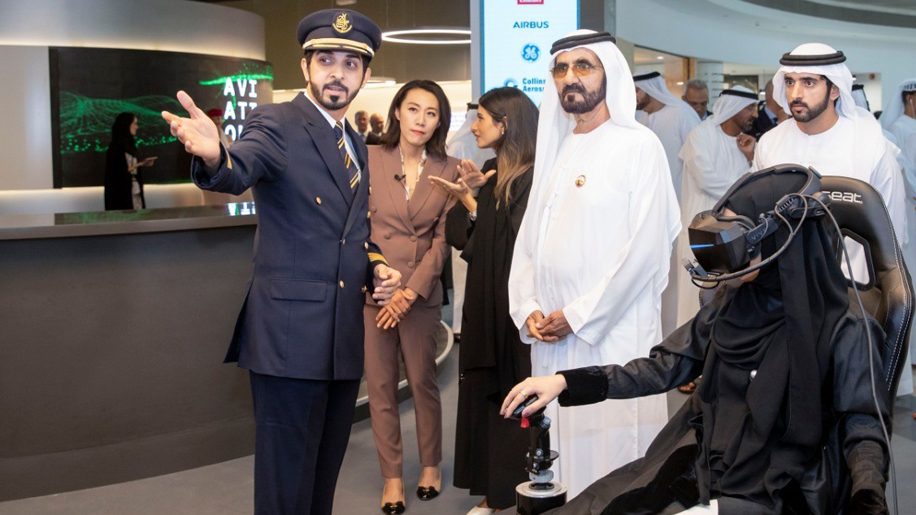
Emirates unveiled its innovation lab called ‘Aviation X Lab’ at Dubai’s Area 2071 event earlier this week in partnership with five global aviation companies in an effort to explore new ideas in air travel.
Aviation X lab, a collaboration between Emirates and Airbus, Collins Aerospace, GE Aviation, and Thales which was founded in 2017, will bring together start-ups, innovators, academics, NGOs, activists and corporates to develop solutions to challenges that will impact the next generation of global travel.
Teams will be selected and brought to Dubai to co-create, experiment and develop prototypes in Area 2071, a conference which Emirates describes as an “ecosystem to design the future that includes government, creative individuals, innovative companies, and people”. The airline said up to four teams will be shortlisted, and invited to pitch to investors and venture capitalists for additional funding at Area 2071.
“Dubai is looking to mitigate the challenges in the aviation ecosystem, and we have a laser-sharp focus on the evolution of technology and innovations that impact the industry, communities, future generations and our planet,” said Sheikh Ahmed bin Saeed Al Maktoum, chairman and CEO, Emirates Airline and Group.
The lab is part of the UAE’s efforts to achieve the UAE Centennial Plan 2071 which “seeks to invest primarily in the youth of the UAE and to work for UAE to be the best nation in the world by 2071”, reads a statement from Emirates.
Participants in the innovation lab will have to come up with solutions to two challenges facing the aviation industry. The first challenge is tackling carbon emissions.
“Although the aviation industry is responsible for just 2 per cent of the world’s carbon emissions, the challenge is based on the premise that airlines produces 115gm of CO2 per passenger km, which is 859 million tonnes of CO2 emissions per year. The challenge is to reduce this by 100gm or 87 per cent to 15gm of CO2 per passenger km by 2030,” reads a press statement from Emirates.
The second challenge concerns airports. The airline says “the current model of airports is a barrier to passenger growth” given that the the travel industry is projected to double in the next 15 years.
“The challenge is to rethink the airports’ model to achieve metrics of 10 passengers per M2 of airport infrastructure with a ten-minute maximum transition time between landside and airside,” said Emirates.
Aviation X Lab will work in cycles of 12 months with five key active phases: launching challenges; sourcing start-ups globally; validating concepts; exploring rapid feasibility, and sourcing funding. The deadline for submission is early 2020.
At the Area 2071 event in Dubai earlier this week, demos of three products were shown, one from Thales and two from Emirates. These included the following:
- Bahja – an app created by a team of UAE nationals that uses facial recognition technology to “help measure employee happiness” and provides real-time feedback.
- An AI powered product that attempts to reduce food waste. Emirates said the technology provides real-time predictions and recommendations that ensure customers get their first choice inflight, while minimising quantities of unconsumed food.
- Solo, which Emirates describes as a virtual assistant powered by artificial intelligence that attempts to support pilots in every decisive moment during a flight. Emirates said in the demo, Solo leveraged available data to permanently provide the crew with the most efficient trajectory to optimise flight efficiency and passenger comfort.












